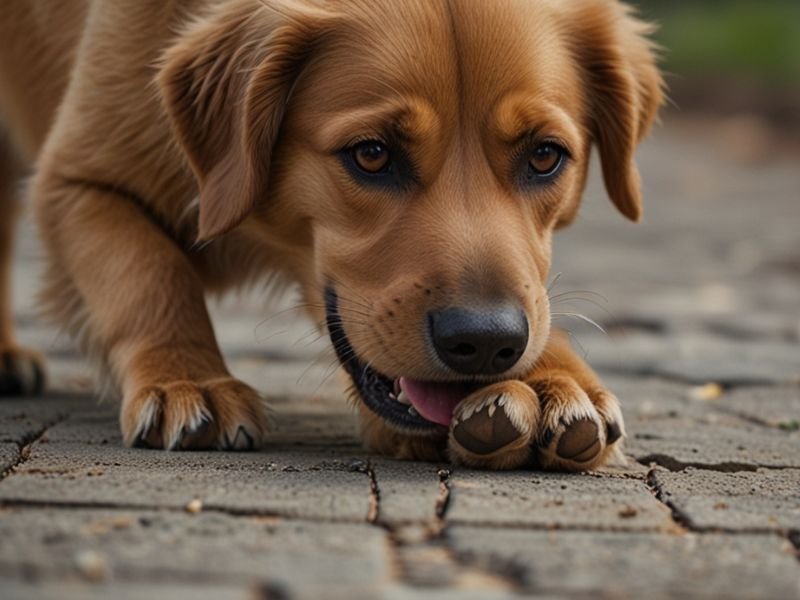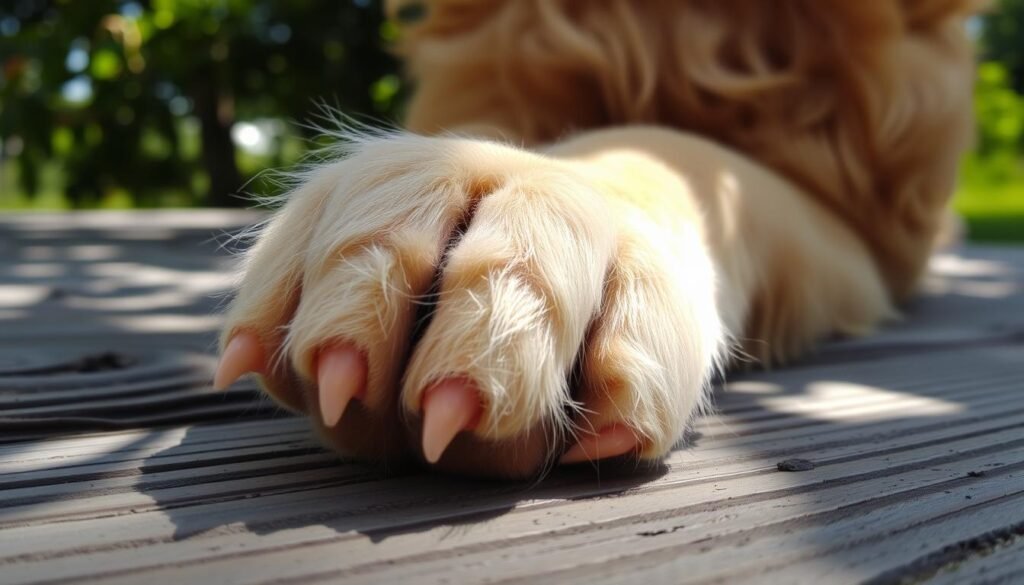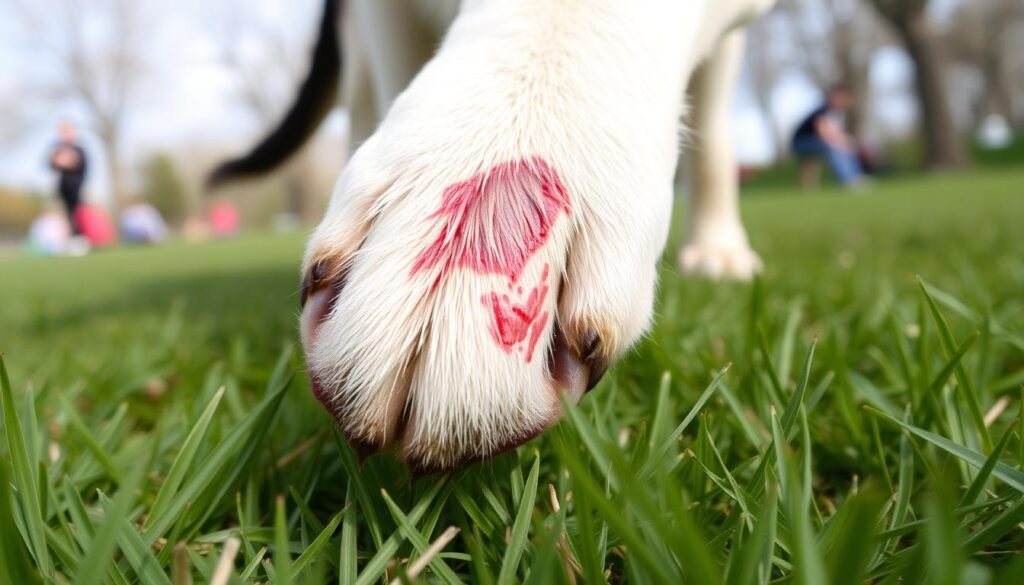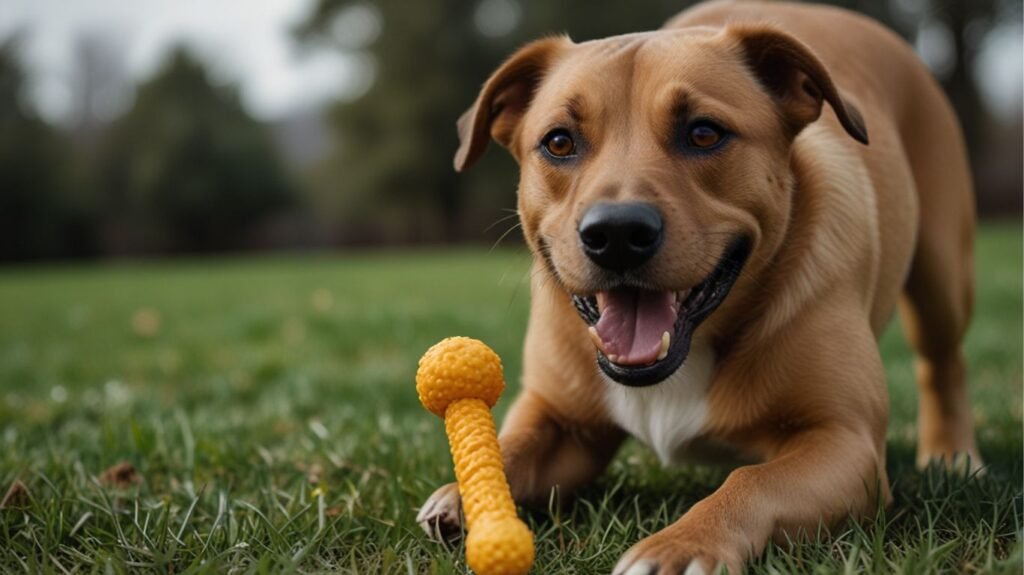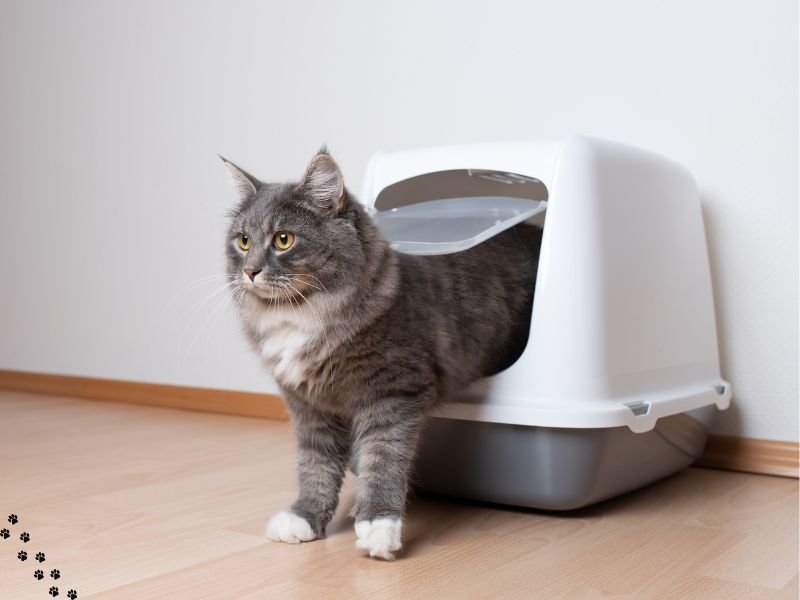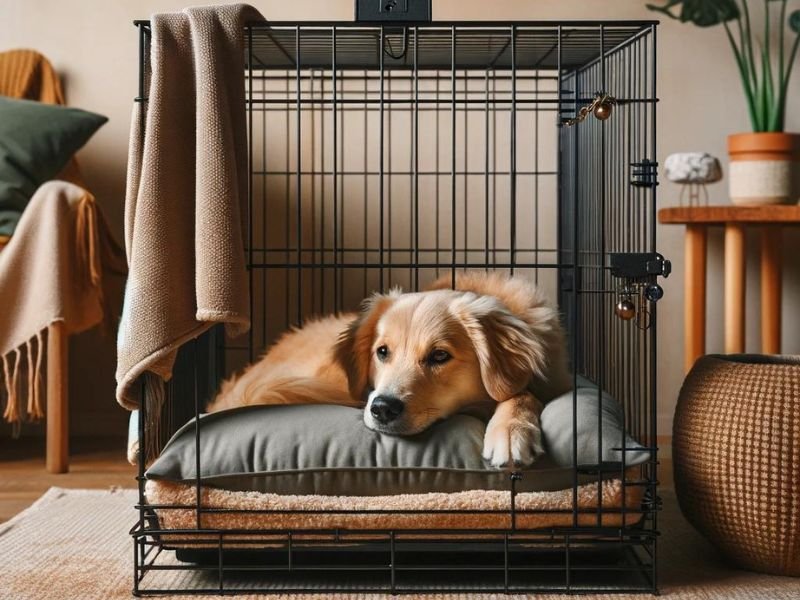Did you know that 15% of all vet visits are for dogs with paw problems? Dogs might lick or chew their paws for many reasons.
This behavior can affect their health and happiness. We’ll look into why dogs chew their paws and how to keep their paws healthy and happy.
Table of Contents
- Key Takeaways
- Understanding Dog Paw Chewing Behavior
- Allergies: A Potential Cause
- Dog Paws: Grooming and Hygiene Matters
- Environmental Factors and Paw Chewing
- Anxiety and Stress-Related Paw Chewing
- Identifying and Treating Paw Injuries
- Nutritional Supplements for Paw Health
- Paw Protection and Prevention Strategies
- Training and Behavior Modification
- Conclusion
- FAQs About Why Do Dogs Chew Their Paws
- What are the common reasons for dogs chewing their paws?
- How can I identify signs of excessive paw chewing in my dog?
- How can allergies cause paw chewing in dogs?
- What are the proper techniques for trimming my dog’s nails?
- How can I keep my dog’s paw pads clean and healthy?
- How can environmental factors contribute to paw chewing?
- How can anxiety and stress affect a dog’s paw-chewing behavior?
- What are common paw injuries in dogs that can lead to paw chewing?
- When should I seek veterinary attention for my dog’s paw issues?
- How can nutritional supplements support my dog’s paw health?
- What paw protection strategies can I use to prevent paw chewing?
- How can training and behavior modification techniques help with paw chewing?
Key Takeaways
- Paw chewing in dogs can be a sign of underlying health or behavioral issues.
- Understanding the common causes, such as allergies, dry skin, or anxiety, is crucial to finding the right solution.
- Proper grooming, nail trimming, and environmental adjustments can help prevent and manage excessive paw chewing.
- Seeking veterinary attention is essential for identifying and treating any underlying medical conditions.
- Providing appropriate chew toys and implementing behavior modification techniques can help curb paw-related anxiety and stress.
Understanding Dog Paw Chewing Behavior
Dogs naturally chew on their paws. This can be due to allergies, skin irritations, injuries, or anxiety. It’s key to spot when they chew too much to find out why and help them.
Common Reasons for Paw Chewing
Dogs chew their paws for many reasons, including:
- Allergies – Allergies can irritate the skin, making dogs lick and chew their dog paws.
- Dry Skin – Dry, cracked paw pads can hurt and make dogs lick or chew their dog paws.
- Injuries – Cuts, burns, or other injuries can make the area sensitive, leading to dog paw chewing.
- Anxiety and Stress – Anxious or stressed dogs may chew their paws as a way to cope.
Identifying Signs of Excessive Paw Chewing
If your dog keeps licking, biting, or scratching their paws, watch out. Excessive dog paw chewing can cause more problems like infections.
It’s important to keep an eye on their paw health and get vet help if needed.
Allergies: A Potential Cause
Dogs chewing their paws can be due to allergies. These can be from the environment or food. Allergies can make a dog’s paws sore and lead to more chewing.
Dogs with allergies might lick, chew, or bite their paws a lot. This is their way of trying to feel better. Finding out what’s causing the allergy is key to stopping the paw chewing.
Some common things that can cause allergies in dogs include:
- Dust mites
- Pollen
- Certain foods, such as beef, dairy, or wheat
- Flea bites
If your dog keeps chewing their paws, see your vet. They can do tests to find out what’s causing it. Then, they can suggest treatments like medicine, special diets, or changes in the environment.
“Addressing allergies is crucial in managing paw chewing behavior in dogs. It’s important to work with your veterinarian to identify and address the root cause of the issue.”
By treating the allergies, you can make your dog feel better. This can stop the paw chewing and help keep their paws healthy.
Dog Paws: Grooming and Hygiene Matters
Keeping your dog’s paws clean and well-groomed is key to stopping them from chewing on their paws.
This means trimming their nails regularly and keeping the paw pads moisturized. This helps prevent dryness and irritation.
Proper Nail Trimming Techniques
Trimming your dog’s nails is vital for their comfort and paw health. Long nails can cause pain and discomfort while cutting them too short can lead to bleeding.
It’s crucial to learn the right way to trim nails. You should ask your vet or a groomer for help to ensure your dog’s nails are cut safely.
Keeping Paw Pads Clean and Healthy
- Check your dog’s paw pads often for cracks, cuts, or irritation.
- Apply a gentle, pet-safe paw balm or wax to keep the pads moisturized, especially in dry weather.
- Wipe your dog’s paws after walks to remove dirt, chemicals, or irritants.
| Dog Paw Care Tip | Benefit |
|---|---|
| Trim nails regularly | Prevents discomfort and strain on the paw |
| Use paw balm or wax | Moisturizes and protects paw pads |
| Wipe paws after walks | Removes irritants and keeps paws clean |
“Proper dog paw grooming and hygiene are essential for your canine’s overall comfort and well-being.”
Environmental Factors and Paw Chewing
Environmental factors can greatly influence the condition of your dog’s dog paws. This includes the weather and the surfaces they walk on.
Dry or cracked dog paw pads can lead to discomfort and increased dog paw chewing. This is an issue that requires attention.
Dealing with Dry or Cracked Paw Pads
Extreme temperatures, harsh weather, and abrasive surfaces can cause dry, cracked dog paw pads. This discomfort can also increase the risk of infections. To address this, consider the following strategies:
- Regularly moisturize your dog’s dog paws with a high-quality dog paw protection balm or wax. This keeps the pads supple and healthy.
- Avoid walking your dog on hot surfaces, such as asphalt or concrete, during the hottest parts of the day. These can rapidly dry out and damage the dog paw pads.
- Protect your dog’s dog paws with booties or paw wax in cold, snowy, or icy conditions. This prevents cracking and irritation.
- Regularly check your dog’s paws for any signs of dryness, cracks, or irritation. Address the issue promptly to prevent further discomfort and potential infections.
By addressing environmental factors that contribute to dry and cracked dog paw pads, you can help alleviate your dog’s dog paw chewing. This maintains their overall paw health and comfort.
| Environmental Factor | Impact on Dog Paws | Recommended Solution |
|---|---|---|
| Extreme Temperatures | Drying and cracking of dog paw pads | Use dog paw protection balms or waxes, and avoid hot surfaces |
| Harsh Weather Conditions | Irritation and damage to dog paws | Protect dog paws with booties or paw wax |
| Abrasive Surfaces | Wear and tear on dog paw pads | Regularly check and address any dryness or cracks |
Anxiety and Stress-Related Paw Chewing
Anxiety and stress can make dogs chew their paws. They chew as a way to cope with their feelings. This shows they need help with their emotional or environmental issues.
Dogs with anxiety might lick, bite, or scratch their paws a lot. This can cause irritation, inflammation, and even wounds.
It’s important to understand why your dog is anxious and find ways to calm them down.
Identifying Anxiety in Dogs
Some common signs of anxiety in dogs include:
- Restlessness or pacing
- Trembling or shaking
- Excessive panting or drooling
- Hiding or avoidance behaviors
- Destructive behaviors like chewing or scratching
Reducing Anxiety and Stress
To help your dog feel less anxious and stop chewing their dog paws, try these:
- Make their environment calm, safe, and comfy.
- Use positive reinforcement and desensitization training.
- Try dog paw health supplements or pheromone products for calmness.
- Encourage regular exercise and play to release energy.
- Talk to your vet for more advice and possible medication.
You can reduce the paw chewing by tackling your dog’s anxiety and giving them support. This helps their overall health and well-being.
Identifying and Treating Paw Injuries
Dogs rely heavily on their paws for movement and comfort. Paw injuries are common and can lead to excessive chewing.
Knowing the common injuries and getting vet help quickly is crucial to avoid more problems.
Common Paw Injuries in Dogs
Dogs can get cuts, abrasions, and even have objects stuck in their paw pads. These can happen from walking on rough ground or playing with harmful toys.
Spotting signs like limping or licking is key to fixing the issue.
Seeking Veterinary Attention for Paw Issues
- Get vet help fast if your dog shows paw discomfort or injury.
- Vets can check the injury, clean it, and give the right treatment to heal it.
- Ignoring paw injuries can cause infections and make your dog chew more, worsening things.
| Common Paw Injuries | Symptoms | Treatment |
|---|---|---|
| Cuts and abrasions | Limping, licking, visible irritation | Cleaning, bandaging, and medication as prescribed by the veterinarian |
| Foreign objects embedded in the paw | Limping, licking, visible object | Removal of the foreign object and treatment of the affected area |
| Cracked or dry paw pads | Discomfort, chewing, visible cracks or dryness | Application of paw balms or waxes to soothe and hydrate the paw pads |
Acting fast on dog paw injuries and getting vet care is vital. It helps your dog heal and keeps their dog paw health in check.
Always watch your dog’s dog paws and act quickly if they show signs of pain.
Nutritional Supplements for Paw Health
Keeping your dog’s paws healthy is key. Adding special supplements to their food can help. These supplements can tackle many paw problems, like paw chewing.
Omega-3 and omega-6 fatty acids are great for fighting inflammation. They can soothe dry, cracked paw pads. This makes your dog’s paws healthier overall.
- Omega-3 and omega-6 fatty acids can help reduce paw inflammation and irritation.
- Glucosamine and chondroitin supplements may support paw joint health and mobility.
- Biotin and other B-complex vitamins can contribute to healthy skin and coat, including paw pads.
Glucosamine and chondroitin can also help with joint health. This can ease the pain that might cause paw chewing.
Biotin and B-complex vitamins keep the skin and coat, including paws, healthy.
“Incorporating a balanced, high-quality dog food and targeted supplements can make a significant difference in the health and appearance of your dog’s paws.”
Always talk to your vet before adding supplements to your dog’s diet. They can help pick the best ones for your dog. Supplements can keep your dog’s paws in top shape.
Paw Protection and Prevention Strategies
It’s important to keep your dog’s paws healthy and safe. Using different strategies can help stop them from chewing their paws. This makes sure your dog stays comfortable.
Using Paw Balms and Waxes
Special paw balms and waxes can protect your dog’s paws. They shield them from things outside that might make them chew.
These products also moisturize and soothe dry, cracked paws, preventing pain and irritation.
Providing Appropriate Chew Toys
Give your dog chew toys that are right for them. Look for tough, safe toys that let them chew without harming their paws. Having many fun chew toys can stop them from chewing their paws.
| Paw Protection Product | Key Benefits |
|---|---|
| Paw Balms | Moisturize and soothe dry, cracked paw pads |
| Paw Waxes | Create a protective barrier against environmental irritants |
| Durable Chew Toys | Redirect chewing behavior away from paws |
Using balms, waxes, and the right chew toys can help stop dog paw chewing. This keeps your dog’s paws healthy and comfy.
“Keeping your dog’s paws protected and providing healthy outlets for their natural chewing instincts is key to preventing dog paw chewing behaviors.”
Training and Behavior Modification
Managing your dog’s paw chewing can be done through training and behavior modification. Redirecting their attention to better activities helps. This way, you can stop paw chewing and keep their paws healthy.
First, find out why your dog chews their paws. It might be due to dog paws, dog paw care, or dog paw health issues like allergies or boredom. Knowing the cause helps you make a better plan to change their behavior.
- Give them fun toys and chew items to chew on instead. Choose sturdy rubber toys or frozen treats.
- Use positive reinforcement to teach them not to chew their paws. Reward them for playing with toys or doing other fun activities.
- Try calming supplements or pheromone products to reduce stress or anxiety that might cause paw chewing.
By using these methods, you can teach your dog better ways to handle stress. This helps protect their dog’s paws and keeps them healthy. With time and effort, your dog will learn to avoid paw chewing and stay safe.
“The key to successful dog paw care is addressing the root cause of the issue, rather than just treating the symptoms. With the right training and behavior modification, you can help your dog develop healthier habits.”
| Training Technique | Description | Benefits |
|---|---|---|
| Positive Reinforcement | Rewarding your dog for desirable behaviors, such as avoiding paw chewing and focusing on approved toys. | Encourage the dog to repeat the positive behaviors, strengthening the bond between you and your pet. |
| Environmental Enrichment | Providing engaging toys, puzzles, and activities to keep your dog mentally and physically stimulated. | Reduces boredom and redirects your dog’s energy away from paw chewing towards more constructive outlets. |
| Calming Supplements | Using natural supplements or pheromone-based products to help alleviate anxiety or stress in your dog. | Addresses the underlying emotional triggers that may be contributing to the paw chewing behavior. |
Remember, being consistent and patient is crucial. By working with your dog and solving the paw chewing problem, you can teach them healthy habits.
This protects their dog’s paws and keeps them happy and healthy.
Conclusion
Keeping your dog’s paws healthy is key to being a good pet owner. Knowing why dogs chew their paws helps you fix the problem. This can be due to allergies, the environment, anxiety, or injuries.
There are many ways to care for your dog’s paws. You can groom them properly, keep their environment clean, or get vet advice. A complete plan for paw health can really help.
By focusing on paw care, you’re making your dog’s life better. You’ll stop paw chewing and keep your dog happy and healthy. This strengthens your bond with your furry friend.
FAQs About Why Do Dogs Chew Their Paws
What are the common reasons for dogs chewing their paws?
Dogs chew their paws for many reasons. These include allergies, dry skin, and anxiety. Stress and paw injuries are also common causes.
How can I identify signs of excessive paw chewing in my dog?
Look for signs like licking, biting, or scratching too much. These are signs of excessive paw chewing.
How can allergies cause paw chewing in dogs?
Allergies can irritate a dog’s paws. This discomfort leads to chewing or licking.
What are the proper techniques for trimming my dog’s nails?
Trimming nails carefully is key. Be careful not to cut too close to the quick.
How can I keep my dog’s paw pads clean and healthy?
Keep paw pads clean and moisturized. Protect them from harsh conditions to prevent dryness and irritation.
How can environmental factors contribute to paw chewing?
Dry or cracked paw pads can cause discomfort. This discomfort may lead to paw chewing.
How can anxiety and stress affect a dog’s paw-chewing behavior?
Stress and anxiety can make dogs chew their paws. Addressing these issues can help reduce this behavior.
What are common paw injuries in dogs that can lead to paw chewing?
Paw injuries like cuts or foreign objects can cause discomfort. This discomfort may lead to paw chewing.
When should I seek veterinary attention for my dog’s paw issues?
Seek vet help if you suspect a paw injury. Also, if paw chewing doesn’t stop despite your efforts.
How can nutritional supplements support my dog’s paw health?
Nutritional supplements can support paw health. They may reduce paw chewing.
What paw protection strategies can I use to prevent paw chewing?
Use paw balms or waxes. Provide suitable chew toys to protect paws and prevent chewing.
How can training and behavior modification techniques help with paw chewing?
Training and behavior modification can redirect paw chewing. They promote healthy habits and prevent issues.

